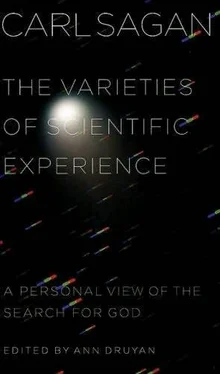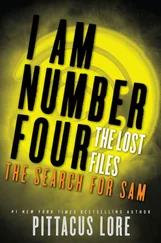CS:It's certainly possible. The only evidence for the existence of Jesus is the four Gospels and the subsequent books. And apart from that, there is merely the account of Josephus in the History of the Jews, which internal evidence suggests was put in by Christian apologists at a later time. On the other hand, for me personally, I find the accounts in the Gospels reasonably internally consistent, and I don't see any particular problem about Jesus as a historical figure in the same sense of Mohammed and Moses and Buddha. For all of them, I would think the least unsatisfactory hypothesis is that they were real people, genuine historical figures, great men, the details of whose lives and missions have been, of course, distorted by subsequent advocates and enemies both. It's inevitable. It's the way humans go about things.
Questioner:I'd like to ask you about why you think any omnipotent being would want to leave evidence for us.
CS:I think I entirely agree with what you say. There is no reason I should expect an omnipotent being to leave evidence of His existence, except that the Gifford Lectures are supposed to be about that evidence. And I hope it is clear that the fact that I do not see evidence of such a God's existence does not mean that I then derive from that fact that I know that God does not exist.
That's quite a different remark. Absence of evidence is not evidence of absence. Neither is it evidence of presence. And this is again a situation where our tolerance for ambiguity is required.
The only thrust of these remarks is for those-and it's by far the greatest majority of contemporary theologians-who believe that there are natural pieces of evidence for the existence of God or gods. And so I have no problems with any of that. And, as you say, if a god existed who gave us free will or merely noted that we had free will, and wished to let our free will operate, then he or she or it might very well give us no evidence of his, her, or its existence for just that reason.
And this is connected with one of the many little tangents in the extraterrestrial-intelligence problem. In fact, there is a perfect parallel between the two cases. Let me spend a moment on it. Two sorts of arguments have been generated. One says that if extraterrestrial intelligence exists, then it would have capabilities vastly in excess of our own. Look at what we've done in just a few thousand years of civilization. Imagine some other beings who are millions or thousands of millions of years more advanced than we. Imagine what they could do. Why aren't they here? Why haven't they so rearranged the cosmos so that their existence is apparent just by looking up at the night sky? "Drink Coca-Cola" spelled out in stars. Something of that sort. A more religious message than that. But why isn't the universe so clearly artificial that there would be no doubt of the existence of extraterrestrial intelligence? This is in no way a different argument; it's just recast in modern language in slightly different terms. And one of the explanations-there are large numbers of them; on an issue with no data it is possible to have very involved debates-one of the explanations is the so-called zoo hypothesis, which says that there is an ethic of noninterference with emerging civilizations, because the extraterrestrials wish to see what humans will do. Let them develop on their own without outside interference, and therefore there is a stringently adhered-to requirement that none of the advanced civilizations make planetfall on Earth. And it seems to me that's very similar, not identical, to what you were saying about omnipotence and free will.
Questioner:Concerning the point about God leaving some amazing piece of evidence in the scriptures of His existence: I think that God's purpose is to leave evidence through all time for all men, even children, to understand that He exists, not to leave one piece of evidence for somebody to discover in a thousand years that will benefit one generation.
CS:No, all generations subsequently.
Questioner:Or all generations subsequently, but- CS: A thousand years is as an instant in Thy sight.
Questioner:As one day. Right. I don't believe as a physicist that physics deals with the truth. I believe that it deals with successive approximations to the truth.
CS:So do I.
Questioner:I think if it ever dealt with the truth, that we'd be out of a job. So I am aware in the history of physics that you can't say that you've got the definitive equation for gravity or the definitive equation for quantum mechanics or anything like this. And that reminds me, actually, of a quote from Einstein that says God doesn't play with dice. And I find that difficult to reconcile with the views that you put out for Einstein's assumption that God was equivalent to the universe and the laws of quantum mechanics.
CS:Surely that is consistent. All he was saying is that he believed there were hidden variables behind which the statistical regularities of quantum mechanics could be derived in the same sense that ordinary Newtonian mechanics could. That's all he said.
Questioner: Yes, but he was not accepting present-day quantum mechanics as being the end of the story.
CS:Right. He was saying that the indeterminacy of quantum mechanics conflicted with his sense of a universe ruled by physical laws.
Questioner:And he put that down to God. CS:Which he called God. That's right.
Questioner:Thank you.
CS:But which is very different from the traditional kind of God.
Questioner:Well, it may or may not be.
CS:Einstein was explicit that it was different. For example, in his first visit to the United States, he was sent an anguished telegram by the archbishop of Boston wanting to know what exactly were his religious views. And he spelled them out very explicitly and very courageously, and there was no question that it was not the traditional religious view of God. I mean, it doesn't matter, because Einstein is just one man. But since we all admire him, it's good to know what he actually said.
Questioner:Yes.
CS:And it was not the traditional view at all.
Questioner:Yes, well, yes. I accept that. Talking about proofs for the existence of God, I'd like to put it in perspective that there's no completely satisfactory proof that everyone in this room exists. I don't know if you know of one. I think it comes down in the end to belief of one sort or another that people in this room exist, and putting the proofs about God's existence in that context, we're demanding a lot more in proving God's existence than we are in proving our own existence.
CS:But the burden… the burden of proof is on those who claim that God exists. Or do you think not?
Questioner:I think you say that. I don't think that, in fact. CS:You think the burden of proof is on those who say that God does not exist?
Questioner:An equal burden of proof, I would say. I don't see why it should be put to those who say that He exists.
CS:But would you say that, no matter what contention is made, that the burden of proving or disproving it falls equally on those who agree and those who disagree?
Questioner:I would say that.
CS:Have you thought of the political applications of this?
Questioner:Well, it's not a political issue, I don't think. CS:No, but I thought it was a general proposition you were proposing.
Читать дальше










